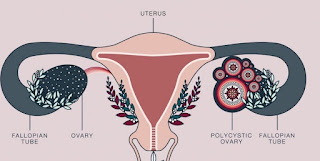ALL ABOUT: POLYCYSTIC OVARIAN SYNDROME
Edited by, SOWNDHARYA
OVERVIEW:
Polycystic ovary syndrome (PCOS) is a hormonal disorder common among women of reproductive age. Women with PCOS may have infrequent or prolonged menstrual periods or excess male hormone (androgen) levels. The ovaries may develop numerous small collections of fluid (follicles) and fail to regularly release eggs. The exact cause of PCOS is unknown. Early diagnosis and treatment along with weight loss may reduce the risk of long-term complications such as type 2 diabetes and heart disease.
SYMPTOMS:
Signs and symptoms of PCOS often develop around the time of the first menstrual period during puberty. Sometimes PCOS develops later, for example, in response to substantial weight gain. Signs and symptoms of PCOS vary. A diagnosis is made when you experience at least two of these signs:
- Irregular periods: Infrequent, irregular or prolonged menstrual cycles are the most common signs of PCOS. For example, you might have fewer than nine periods a year, more than 35 days between periods and abnormally heavy periods.
- Excess androgen: Elevated levels of male hormones may result in physical signs, such as excess facial and body hair (hirsutism), and occasionally severe acne and male-pattern baldness.
- Polycystic ovaries: Your ovaries might be enlarged and contain follicles that surround the eggs. As a result, the ovaries might fail to function regularly.
The exact cause of PCOS is not known. Factors that might play a role include:
- Excess insulin: Insulin is the hormone produced in the pancres that allows cell to use sugar, your body's primary energy supply. If your cells become resistant to the action of insulin, then your blood sugar levels can rise and your body might increase androgen production, causing difficulty with ovulation.
- Low grade inflammation: This term is used to describe white blood cells' production of substances to fight infection. Research has shown that women with PCOS have atype of low-grade inflammation that stimulates polycystic ovaries to produce androgens, which can lead to heart and blood vessel problems.
- Heredity: Research suggests that certain genes might be linked to PCOS.
- Excess androgen: The ovaries produce abnormally high levels of androgen, resulting in hirsutism and acne.
Complicatins of PCOS can include:
- Infertility
- Gestational diabetes or pregnancy-induced high blood pressure
- Miscarriage or premature birth
- Non-alcoholic steatohepatitis - a severe liver inflammation caused by fat accumulation in the liver
- Metabolic syndrome- a cluster of conditions including high blood pressure, high blod sugar, and abnormal cholesterol or triglyceride levels that significantly increase your risk of cardiovascular disease.
- Type 2 diabetes or prediabetes
- Sleep apnoea
- Depression, anxiety and eating disorders
- Abnormal uterine bleeding
- Cancer of the uterine lining (endometrial cancer)
There is no single test that, by itself, shows whether you have polycystic ovary syndrome, or PCOS.Your doctor will ask you about your symptoms and give you a physical exam and blood tests to help find out if you have this condition.
PCOS is a common hormone disorder that can cause problems with your period, fertility, weight, and skin. It can also put you at risk for other conditions, such as type 2 diabetes. If you, have it, the sooner you find out, the sooner you can start treatment.
Your doctor will want to know about all the signs and symptoms you have noticed. This is an important step to help figure out whether you have PCOS, and rule out other conditions that cause similar symptoms.
You will need to answer questions about your family's medical history, including whether your mother or sister has PCOS or problems getting pregnant. This information is helpful- PCOS tends to run in families.
Be ready to discuss any period problems you've had, weight changes, and other concerns.
Your doctor may diagnose PCOS if you have at least two of these symptoms:
- Higher levels of androgens (male hormones) shown in blood test or through symptoms like acne, male-pattern balding, or extra hair growth on your face, chin or body.
- Cysts in your ovary as shown in an ultrasound
- Irregular periods
Your doctor may check your blood pressure, BMI (Body mass index), and your waist size. They may also look at your skin to check for extra hair growth,acne, and discoloured skin, which can all happen when you have PCOS.
PELVIC EXAM:
This is just like what happens when you get regular check-up.Your doctor will look at and feel areas of your body including the vagina, cervix, uterus, fallopian tubes, ovaries and rectum, checking for anything unusual.
PELVIC SONOGRAM:
This produces an image of what your ovaries look like. For the ultrasound, you lie down and your doctor briefly places an ultrasound device in your vagina.The doctor will check for cysts in your ovaries and how thick is the lining of your uterus.That lining may be thicker than normal, if your periods aren't happening when they are supposed to.
Your ovaries may be 1&1/2 to 3 times thicker when you have PCOS.The ultrasound can show ovary changes in about 90 % of women who have PCOS.
HAEMATOLOGICAL STUDIES:
- Follicle stimulating hormone (FSH) affects your ability to get pregnant.Your level might be lower than normal, or even normal, if you have PCOS
- Luteinizing hormone (LH)encourages ovulation.It could be higher than normal
- Testosterone is a sex hormone that would be higher in women having PCOS
- Oestrogens are a group of hormones that allow women to get their periods. Your levels may be normal or high, if you have PCOS
- Your level of sex hormone binding globulin (SHBG) may be lower than normal
- A sex hormone called androstenedione may be at a higher-than-normal level.
Treatments can help you manage the symptoms of polycystic ovary syndrome (PCOS) and lower your odds for long-term health problems such as diabetes and heart disease.
You and your doctor should talk about what your goals are, so you can come up with a treatment plan. For example, if you want to get pregnant and you are having trouble,then your treatment would focus on helping you conceive.If you want to tame PCOS-related acne,your treatment would be geared towards skin problems.
LIFESTYLE CHANGES:
One of the best ways to deal with PCOS is to eat well and exercise regularly.
Many women with PCOS are overweight or obese.Losing just 5-10% of your body weight may ease some symptoms and help make your periods more regular.It may also help manage problems with blood sugar levels and ovulation.
Since, PCOS could lead to a high blood sugar, your doctor may want you to limit starchy or sugary foods.Instead, eat foods and meals that have plenty of fibre, which raise your blood sugar levels slowly.
Staying active, helps you control your blood sugar and insulin, too. And, exercising everyday will help you with your weight.
MENSTRUAL PROBLEMS:
Birth-contol is the most common PCOS treatment,for women who don't want to get pregnant. Hormonal birth-control --pills, a skin patch, vaginal rings, shots, or a hormonal IUD (intrauterine device)--can help restore regular periods.
These birth control methods may also lower your chance of having an endometrial cancer, in the inner lining of the uterus.
When a healthy diet and regular exercise aren't enough weight, medications can make losing weight easier.Different drugs work in different ways.Your doctor will prescribe the medication they think will be most successful for you. Options include:
METFORMIN (Fortamet,Glucophage) : This drug lowers insulin levels. It can help with weight loss and may prevent you from getting type 2 diabetes.
If you are severely obese, and other methods haven't helped you reach a healthy weight, your doctor may suggest you weight loss surgery. The change in your weight afterward can regulate your menstrual cycle and hormones and cut your odds of having diabetes.
EXCESSIVE HAIR GROWTH:
Sometimes PCOS causes unwanted hair growth, which your doctor can treat with medications and hair removal methods, such as:
Depilatories: These are creams, gels and lotions that can break down the protein structure of hair so it falls out of the skin. Follow the directions on the package.
Electrolysis or Laser therapy: Electrolysis removes individual hairs with an electric current that destroys the root. Laser therapy destroys hair follicles. You'll need several sessions, and though some hair may come back, it should be finer and less noticeable.
Hormonal birth control: Birth and other contraceptives that use hormones can also treat unwanted hair growth and acne.






















.png)

![INFECTIOUS DISEASES SEXUALLY TRANSMITTED DISEASES[STDs]](https://blogger.googleusercontent.com/img/b/R29vZ2xl/AVvXsEiR4W_g1yby3uPsigmeL1UlydsQ3XspjBcnH9gN5y4f7hVejEenDkytxrtwOM5zBwUfblnXv-uoM-kV8vFGan3hdMAgvE4UW4q95_ahmpuCtTGcSTKXel7d5PEX0CgBlzzpZBRGJWIlw_FvUePtxw9S5tnFou1oJVodPyKP29sX6nvc6WvRkmLztlhQe7M/s72-c/md%20dengue.jpg)







No comments:
Post a Comment